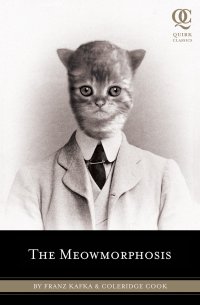Review: 'The Meowmorphosis', by Coleridge Cook
Or “by Franz Kafka & Coleridge Cook”, as the cover and title page say. This is a rewriting by Cook of Kafka’s famous novella to turn Gregor Samsa from a giant insect1 into an adorably cute kitten.
This is a straightforward copy of Kafka’s text, with just the descriptions of Samsa-as-an-insect changed to make him a kitten and to do kittenish things. “He lay in bed on his soft, fuzzy back and saw, as he lifted his head a little, his brown arched abdomen divided into striped bowlike sections.”
Upon seeing the picture of a woman in a fur hat and fur boa, “Samsa felt a powerful urge to leap upon the sample clothes and scratch at them thoroughly, but as soon as it had come, it passed.”
When he is called by his mother to get up:
Gregor began to answer but was startled when he heard his own voice: It was clearly and unmistakably his own, but in it was intermingled as if from below, an irrepressibly pert and endearing squeaking …” When his sister asks if he is all right, “He made an effort with the most careful articulation and by inserting long pauses between the individual words to remove everything mewling and kittenish from his voice.
...
At first he wanted to get out of bed with the lower part of his body, but this lower part – which, by the way, he had not yet looked at and which he also couldn’t picture clearly – proved itself too difficult to move, particularly with what felt like a long, bushy tail added to the equation. … He could not abide his tail being squashed most of all. The disaster also revealed to Gregor Samsa that he was quite a LARGE kitten, for his upper parts were still curled up sweetly in bed.
Cook has to employ greater ingenuity to keep the text closer to Kafka’s after his family and the boarding house manager break into his room, because their revulsion when confronted by a giant insect does not make sense when confronted with a giant cute kitten. But by the nature of this parody, he is forced to bring Samsa to the same melancholy fate.
The story is enhanced with Richardson’s ten full-page paintinglike illustrations featuring Samsa as a kitten, and with Cook’s coy but generally accurate thirteen-page Appendix, “The Curious Life of Franz Kafka, author of The Metamorphosis”, in which he purports to prove that Kafka was haunted throughout his life by cats. Cook correctly notes that the German word ‘Ungeziefer’, which the translators have always rendered as ‘insectlike’ (due doubtlessly to Kafka’s later descriptions of Samsa’s hard carapace), literally means ‘unclean animal unsuited for sacrifice’ (Kafka’s father came from a family of Jewish butchers), which will do equally for cat or insect.
Readers will appreciate The Meowmorphosis more if they are familiar with Kafka’s original novella, but this book stands admirably on its own. Nonetheless, it may be meant more for literary enthusiasts than for Furry fans.
See also: A second opinion by Jules on GeekMom
1 The opening line of Kafka’s The Metamorphosis is, “As Gregor Samsa awoke one morning from uneasy dreams he found himself transformed in his bed into a gigantic insect [or insect-like creature].” When Kafka first submitted the story in 1915, the publisher wanted to illustrate it showing Samsa as a giant cockroach. Kafka objected vehemently; the book should not illustrate Samsa at all, but leave him vaguely described in the text as a generic beetle-like insect to let the reader imagine what he looked like. As soon as Kafka died in 1924, the publisher added illustrations showing Samsa as a cockroach. He has become firmly established as a giant cockroach ever since.
P.S.: Quirk Books has been specializing in fantastic rewrites of literary classics. In addition to The Meowmorphosis, it has published Pride and Prejudice and Zombies, by Jane Austen and Seth Grahame-Smith (which has been popular enough to encourage two original sequels); Sense and Sensibility and Sea Monsters, by Jane Austen and Ben H. Winters; and Android Karenina (New Yorker review), by Leo Tolstoy and Ben H. Winters. Okay …
P.P.S.: The publisher’s marketing coordinator also offered me a review copy of Crafting With Cat Hair; Cute Handicrafts to Make With Your Cat, by Kaori Tsutaya & Amy Hirschman. It sounds like it is more for devoted cat lovers than for Furry fans, but you can read the description in Quirk Books’ online catalogue and decide for yourself whether you want it.
About the author
Fred Patten — read stories — contact (login required)a retired former librarian from North Hollywood, California, interested in general anthropomorphics

Comments
I've read Pride and Prejudice and Zombies -- it was clever enough, but all the ones that have come after have just struck me as blatant capitalizing on the resultant fad of novelty public-domain classics. At least it looks like Quirk is branching out beyond that now and not just being a one-trick publisher.
Thank you for mentally scarring me with this image.
Have this:
http://www.uploadimages4free.com/upload/big/vid_medvedev-14539.jpg
Post new comment